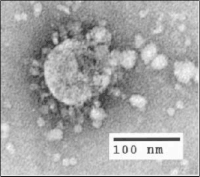
Photo from wikipedia
Infections with lethal influenza viruses lead to acute lung injury (ALI) or acute respiratory distress syndrome (ARDS), which may be related to the activation of the host's immune system. Here,… Click to show full abstract
Infections with lethal influenza viruses lead to acute lung injury (ALI) or acute respiratory distress syndrome (ARDS), which may be related to the activation of the host's immune system. Here, in our study, male C57BL/6 mice were infected with 10 LD50 of the H5N1 influenza virus and treated with geldanamycin or oseltamivir 2 h after infection. Lung injury was assessed by histopathology on days 4 and 7. The viral load was quantified by measuring the NP gene expression level on days 2, 4, and 7. Levels of cytokines and chemokines in bronchoalveolar lavage fluids and inflammatory cells were analyzed at different time points. Geldanamycin administration prolonged survival in mice and dramatically reduced lung injury and pulmonary inflammatory compared with other mice. Viral loads in geldanamycin-treated mice also significantly reduced compared with non-treated mice, but not to the extent as the oseltamivir-treated mice. Furthermore, the geldanamycin treatment markedly reduced the production of major proinflammatory cytokines and chemokines and attenuated the infiltration and activation of immune cells, but it did not alter the generation of virus-neutralizing antibodies. In conclusion, geldanamycin plays an important role in attenuating virus infection-induced ALI/ARDS by reducing the host's inflammatory responses and may provide an important reference for clinical treatments.
Journal Title: Frontiers in Cellular and Infection Microbiology
Year Published: 2017
Link to full text (if available)
Share on Social Media: Sign Up to like & get
recommendations!